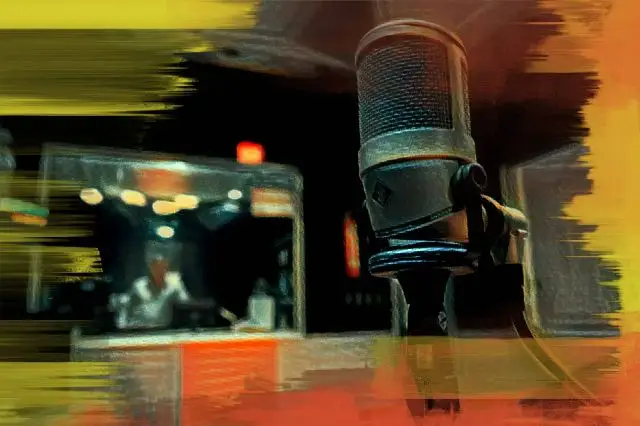When it comes to recording vocals, it's incredibly important to find the right microphone for the job. You need to find the best microphone for vocals suited to your individual voice to properly capture the tone and inflection you're looking for in a song.
However, stumbling upon this information is easier said than done. Since the best microphone for vocals will change from one individual to the next, you have to know what to look for when recording vocals.
Thankfully, we've put together the ultimate guide on how to find the best microphone for vocals, regardless of where you source your equipment. Below, we'll share what goes into picking out the best vocal mic for your needs and share some examples of great vocal microphones you should certainly try out.
Picking Out A Vocal Microphone: 9 Key Considerations For The Best Vocal Mics
Not all microphones for vocals are created equally. This buyer's guide is designed to help you weigh the pros and cons of several vocal recording mics so that you're purchasing the best microphone for your individual voice. Here are several factors you need to consider when shopping for the best vocal mics out there:
Microphone Type
There are several different types of microphones that respond differently to people's voices. While the most popular vocal microphone type is undoubtedly condenser microphones, you're likely to see other types of studio microphones throughout your career in the music industry.
When it comes to finding a microphone for recording, you'll usually come across a condenser mic since condenser mics are designed to pick up a bright, smooth sound that is usually well-suited for pop music and other similar genres.
This microphone type picks up less low frequencies which can help with microphone issues like the proximity effect. The proximity effect states that the closer you are to the microphone, the more low end the microphone will capture. Therefore, condenser mics can help lessen the damage of this naturally occurring phenomenon.
You'll also see the dynamic microphone as a popular choice for vocal recording. Dynamic mics are much sturdier than the delicate condenser microphone, making them better suited for genres like rock and rap that require a more intense, upfront vocal delivery. A dynamic microphone is also commonly used in live performance simply for its sturdiness and ease of use. If a singer is holding and performing with a microphone on stage, chances are it's a dynamic microphone.
The final type of microphone that you'll usually see when vocal recording is a ribbon microphone. These microphones are delicate like a condenser microphone, but have a flatter frequency response, meaning that they don't boost the high end as much as one would see with a condenser mic. Ribbon microphones are great for capturing a truly "live" feel, making them great for genres like Jazz which prioritize live performance.
Frequency Response
Every piece of audio equipment has a separate frequency response, meaning that each piece of equipment interprets sonic information differently. A flat frequency response refers to audio equipment that captures music as is, without boosting different parts of the frequency spectrum.
Microphones will often have a frequency response with a slightly boosted high end to emphasize the best parts of a vocal performance. Sometimes this feature can be toggled on or off, but it's often toggled on by default, so it's worth understanding while capturing vocal recordings.
Diaphragm Size
The diaphragm of a microphone is responsible for converting sonic energy to electrical energy which naturally affects a mic's dynamic range and sensitivity. Generally speaking, the larger the diaphragm, the more detail you're going to get in the audio recording and the pickup pattern of the microphone. A large diaphragm microphone will be able to pick up more detailed sound waves than a small diaphragm microphone, but it will also be more fragile as a result.
Use Case
Solo artists and vocalists are going to have different needs than engineers who run their own professional or home studio . In addition, the industry standard for recording vocal audio may be a condenser microphone, but if you're trying to capture a live performance, or perform in a genre that requires a more assertive vocal delivery, condenser studio mics probably aren't the best pick for your situation.
Your recording environment, vocalist, and vision for recording will ultimately determine what sort of mic you need to thrive. Your home studio might need multiple vocal microphones to record different types of vocalists.
Budget
There's no mistaking that finding a great vocal microphone can unfortunately be incredibly expensive. However, you shouldn't let this stop you from creating music. For every high-end lifetime-use boutique microphone, there are plenty of affordable microphones that will get the job done.
Don't let your equipment be the end all be all. There are plenty of famous songs that were famously recorded under subpar conditions. On the contrary, if you plan on building up a long-lasting kit, it may be worth investing in a higher-quality microphone upfront so that you can dependably use it for years to come.
Note that regardless of how expensive your equipment is, you should always take good care of it. Vocal microphones are particularly sensitive, so you'll need to be careful not to bump or drop these microphones as much as possible. Finding a vocal mic that fits within your price point can be challenging, but we'll share a wide range of options below so that you can find the right solution for the current stage in your career.
Latency
Latency refers to the amount of delay between an audio source and the picked-up signal. You want to aim for the least amount of latency possible when vocal recording so that you can produce the purest vocal recording possible.
In most cases, this is why you would avoid picking out a USB microphone or microphone that connects via Bluetooth, as these can lead to additional latency. Seek vocal mics that connect directly to an audio interface via XLR.
Vocal Polar Pickup Patterns
A polar pattern refers to how a microphone picks up sound. Most vocal microphones operate off of cardioid pickup pattern formations. These microphones are designed to take in sound from a single direction while blocking out the sound around and behind the direct source.
Other patterns include figure 8 and omnidirectional along with the cardioid pattern. These polar patterns pick up more sound from the sides and back of the sound source which can be useful when recording group vocals into a single audio source. However, in most cases, you'll opt for a classic cardioid pickup pattern while recording vocals.
Phantom Power Usage
Condenser microphones and other vocal microphones sometimes require external power, called phantom power. Without this source, the microphone would be unable to capture sound, rendering it useless. Thankfully, most audio interfaces hold a built-in source of phantom power so it shouldn't be too hard to power your vocal mic.
Microphone Accessories
When purchasing a vocal recording microphone, you'll need to leave some room in your budget for microphone accessories to help your recordings shine. Occasionally, these accessories come in microphone bundles, but they aren't always guaranteed, so you'll have to take stock of what is and isn't included with your purchase.
Some microphones, for instance, may come with a shock mount or pop filter, for example, but you'll still need a sturdy mic stand and ideally some acoustic sound treatment materials .
Don't necessarily jump at microphone bundles simply for the cost break. A low price isn't going to make up for poor sound quality. If the microphone wouldn't be a good fit for you on its own, then it's certainly not going to be a good fit within a bundle.
You'll also need other accessories like an audio interface, preferably one with built-in phantom power, a digital audio workstation to record your tracks, and cables to convert the signal into an electronic recording. Some microphones will also require preamps to help bring up the starting gain, especially if you lean toward a fairly quiet vocal performance.
9 Best Microphones For Vocals
Without further ado, here are some of our top picks for the best vocal microphones. The best microphone for vocals will vary depending on the singer's range and use case, but these vocal microphones are all a safe bet based on the features outlined below.
1. Shure SM7B: Best All-Around Vocal Microphone
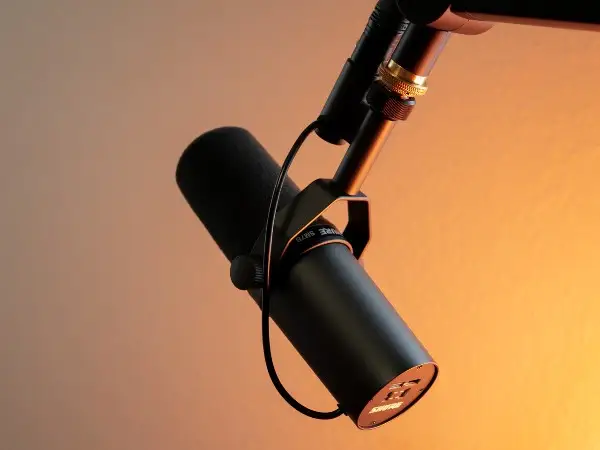
The Shure Sm7B is regarded as a music industry standard for good reason. Whether you're laying down tracks or recording voiceovers, this versatile condenser microphone gets the job done with ease. This microphone has a strong, balanced tone that sounds great in anything from R&B to pop recordings.
It also has built-in protection against the electronic hum that sometimes comes across during processing, so it's a great vocal mic to use in the studio. This durable microphone keeps outside noise to a minimum and has an onboard EQ for further adjustments. It's important to note, however, that the audio from an SM7B will likely need a boost from a well-positioned pre-amp.
PROS:
- Though this is a condenser microphone, the Shure SM7B picks up a fairly natural sound, making it well suited for a variety of genres and recordings
- Great vocal quality for a fairly affordable cost
- Built-in EQ features
CONS:
- You'll probably need to pick up a basic preamp to use this studio microphone effectively
Our Verdict:
Overall, the Shure Sm7B is an excellent vocal microphone that gives you an excellent bang for your buck. It's one of the best microphones for its mid-range price and has incredible flexibility for a condenser mic.
2. AKG C414 XlII: Most Flexible Microphone
This dependable microphone is well loved throughout the industry for its reputation as a clear, crisp vocal mic with an extended frequency range. This microphone can pick up any audio you throw at it with remarkable accuracy, serving up audio with golden sound quality.
This microphone is also incredibly flexible. Whether you're singing in the studio or on stage, there are plenty of features to help customize your tracking experience. With a built-in low cut filter, full polar pattern control, and volume pad, you can shape your sound quite a bit before even hitting the audio interface.
PROS:
- Easy switching between different polar patterns.
- Can be used in certain live settings.
- Crystal clear sound quality with plenty of adjustable toggles.
CONS:
- This high-end microphone comes at a high cost, even if it's a contender for the best microphone for vocals.
- While this microphone can be used live, it's still a sensitive condenser microphone that might not be the best pick for intense live performances.
Our Verdict:
There's no denying that this microphone is pricey. However, the quality and flexibility of this microphone shine through, making this a lifelong investment, so long as you are able to take care of this sensitive microphone properly. This microphone is a dream for any professional or home studio engineer with its embedded EQ options and wide frequency response.
3. Neumann TLM 103: Best Boutique Vocal Microphone
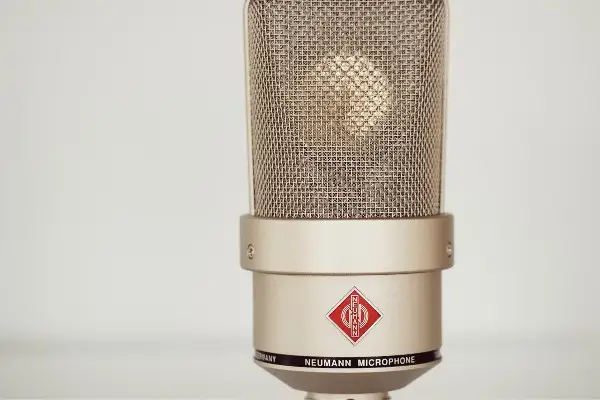
This cardioid condenser microphone aims to provide consumers with Neumann's famous quality, at a third of the price of a revered Neumann U87. This microphone provides a crisp, clear range for capturing sound for warm and open vocals. As a large diaphragm microphone, it's no surprise that the Neumann TLM 103 is an incredibly accurate vocal microphone that works well for a myriad of voices, making it well-suited for a studio setting.
PROS:
- Incredible clarity and accuracy.
- Neumann level quality at a great price point for microphones of this caliber.
- Great warmth to the tone quality. Neumann made the best microphone for vocals for those who are seeking a specific cozy sound.
CONS:
- This microphone only has a cardioid pickup pattern. It's not super versatile and will be used fairly exclusively for vocal recording.
Our Verdict:
If you're seeking a high-quality vocal microphone and you're ready to invest in a great piece of gear, this microphone is a great choice. It might only have one pickup pattern, but its frequency response is wide and clear, making this a great microphone for picking up just about anyone's vocals. This microphone is a staple in the studio, providing the Neumann signature warmth and accuracy while recording. It doesn't necessarily come at a low price, but it's still quite a good deal for its class of microphones.
4. Sennheiser E945: Best Dynamic Microphone
If you need a tool for live performance, the Sennheiser E945 is a great dynamic mic that performs perfectly under live settings with a wide frequency range. This microphone provides an impressive amount of clarity. It has a wider range but still acts more or less as a cardioid microphone.
PROS:
- Excellent, versatile dynamic mic for live performance
- Great built-in noise reduction
- Clear, amplified vocals perfect for any stage
CONS:
- This microphone is primarily used for live performance
- Picks up less low end
Our Verdict:
This is one of the best performance vocal microphones you can find with a clear vocal response and impressive pickup for just about any live vocalist. It also comes with a 10-year warranty, so you can be sure that this dynamic microphone is built to last for years to come. This dynamic microphone picks up vocals without catching excess noise.
5. Blue Yeti: Best USB Vocal Microphone
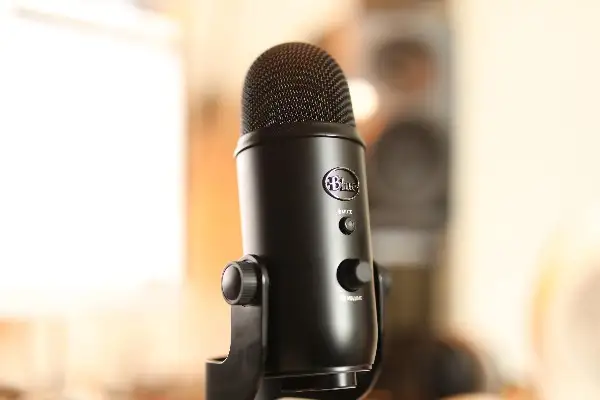
We all yearn to have a high-quality microphone in our arsenal. However, studio microphones meant to last a lifetime can be incredibly expensive. Luckily, you can still get clean vocals in an affordable package with options like this USB microphone from Blue Yeti. This microphone is fairly durable and hosts cardioid, stereo, omnidirectional, and bidirectional patterns for recording just about anything. This microphone also comes with its own stand though it can also be affixed to a traditional microphone stand.
PROS:
- Decent sound for an entry-level microphone
- Impressive polar pattern flexibility makes this microphone surprisingly versatile
CONS:
- USB microphones can degrade more quickly and add unnecessary latency to a recording
Our Verdict:
Generally speaking, we don't recommend USB microphones as they can add unnecessary latency to recordings. However, if you need an affordable vocal recording microphone to start out with or record scratch vocals while on the road, this is a pretty good pick. This USB microphone provides a surprising amount of flexibility with its various pickup pattern options and low noise capacity. If you're ever in a situation where you need to record vocals without an interface, this is the go-to microphone for you.
6. Electro-Voice RE20: Best Vocal Microphone With A Flat Frequency Response
This dynamic cardioid microphone is well-loved in studios all over the world. While it is a dynamic microphone, it picks up an impressive amount of sound across the frequency spectrum, leading many to compare this microphone to a condenser with a sturdier build. This microphone is known for its fairly flat response, creating an honest depiction of any voice you put in front of it.
PROS:
- This dynamic microphone has a condenser-like clarity that is hard to beat within its class
- Rock, rap, and other vocalists who work with a more up-front delivery will perform well with this microphone
- Super versatile microphone for capturing clear vocals
CONS:
- This is one of the heaviest dynamic microphones around
- The flat frequency response may mean that you might have to do more work in post to make the audio from the microphone shine, depending on the context.
Our Verdict:
This microphone is honest. It will effortlessly capture the full scope of the frequency spectrum, providing condenser-like clarity in a large diaphragm dynamic microphone package. The EV RE20 has the advantage of being more robust than a typical condenser microphone, so you might not have to shell out the perfect pop filters or acoustic treatment to get this microphone to work with you.
Note that because it has a flat frequency response, it may need some extra work during the post-production process to help it hold its own. While it's more expensive than your first entry-level microphone, it's an amazing value for the price, and the mic's sturdy build and accurate capturing means that you'll be able to utilize the microphone for years to come.
7. Audio-Technica AT2020: Best Budget Vocal Microphone
If you're seeking a high-quality condenser microphone, it's hard to beat the power of this suspiciously low-priced microphone from Audio Technica. The AT2020 is perfect for capturing a crystal-clear pop vocal, and its inexpensive price makes it ideal for taking on the road. The cardioid condenser mic has a well-balanced sound, and its hard to match this microphone's value for the price.
PROS:
- This is one of the best entry-level condenser microphones out there.
- With clear sound and a cheap price, this microphone is great for home or makeshift studio setups.
CONS:
- The noise level isn't great, though this isn't surprising for the price.
- You only have the cardioid pickup pattern.
Our Verdict:
This isn't the nicest microphone available, but you shouldn't cast aside this microphone altogether. It still provides clear, condenser vocals at a fraction of the price of other, expensive mics. If you're looking for an excellent microphone to track pop vocals on a tight budget, it's going to be hard to beat this surprisingly well-balanced mic.
8. Rode NT1-A: Quietest Vocal Microphone
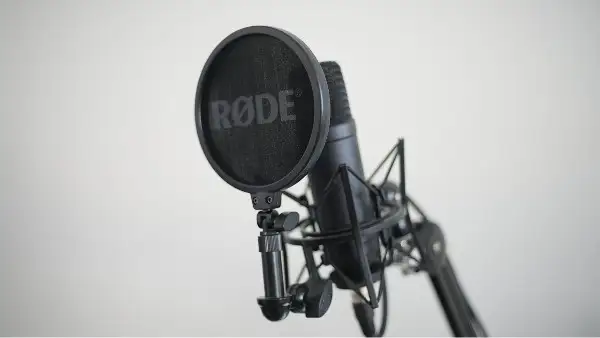
The Rode NT1-A is largely regarded as an entry-level vocal microphone, finding itself in home studio setups worldwide. This microphone can also be purchased in studio bundles by Rode, including pop filters and shock mounts for a quick and easy setup.
This microphone is fairly quiet, so it won't pick up excess noise, though you might need a preamp (along with phantom power) to get the gain up depending on your vocal delivery. With a cardioid polar pattern and a flat frequency response, this microphone will capture singing as is, leaving a blank slate for post-processing.
PROS:
- This microphone can be purchased in a bundle with a pop filter and shock mount to get singers up and going.
- The flat frequency response is great for capturing accurate singing.
- This is one of the best microphones for vocals at its price point.
CONS:
- This mic can pick up sibilance so utilizing a pop filter is a must.
- This delicate microphone doesn't travel very well.
Our Verdict:
This microphone is meant for singing music in a studio setting due to its delicate build. Rode delivers a high-quality mic at a great price, making this a perfect pick for anyone upgrading from a USB microphone. This microphone is a great bang for your buck, and while it's not the best microphone for vocals available, it does an amazing job for artists who are just getting started.
9. Shure SM58: Best Budget Vocal Microphone For Live Performance
While this is the cheapest microphone on our list, the Shure SM58 is a powerful performance microphone and one of the most reliable dynamic microphones available. The cardioid pickup pattern helps emphasize the mid-range frequencies which are well-suited for the stage with a fairly wide frequency pickup range. It's also super durable, so you won't have to worry about damaging this microphone while traveling from one venue to the next.
PROS:
- This microphone is incredibly tough, which is one of the many reasons why it's such a great pick for live performance.
- The ever-portable SM58 picks up an impressive amount of sound for its affordable price point and long-lasting building.
CONS:
- This microphone isn't great for picking up low-end sounds, so the SM58 might not be the best dynamic microphone for vocalists with a lower range.
Our Verdict:
The Shure SM58 is largely regarded as a live performance staple. It might not have as much clarity as the previously mentioned Sennheiser E945 when it comes to dynamic microphones, but you can't beat its durability and ability for the price. Anyone who needs a trusty dynamic microphone for live performance should have one of these in their audio kit.
Finding the right microphone for recording vocals is a very individualized choice. However, using these purchasing points and popular recommendations, hopefully, you're able to land on a couple of serious contenders for your ideal vocal microphone.


